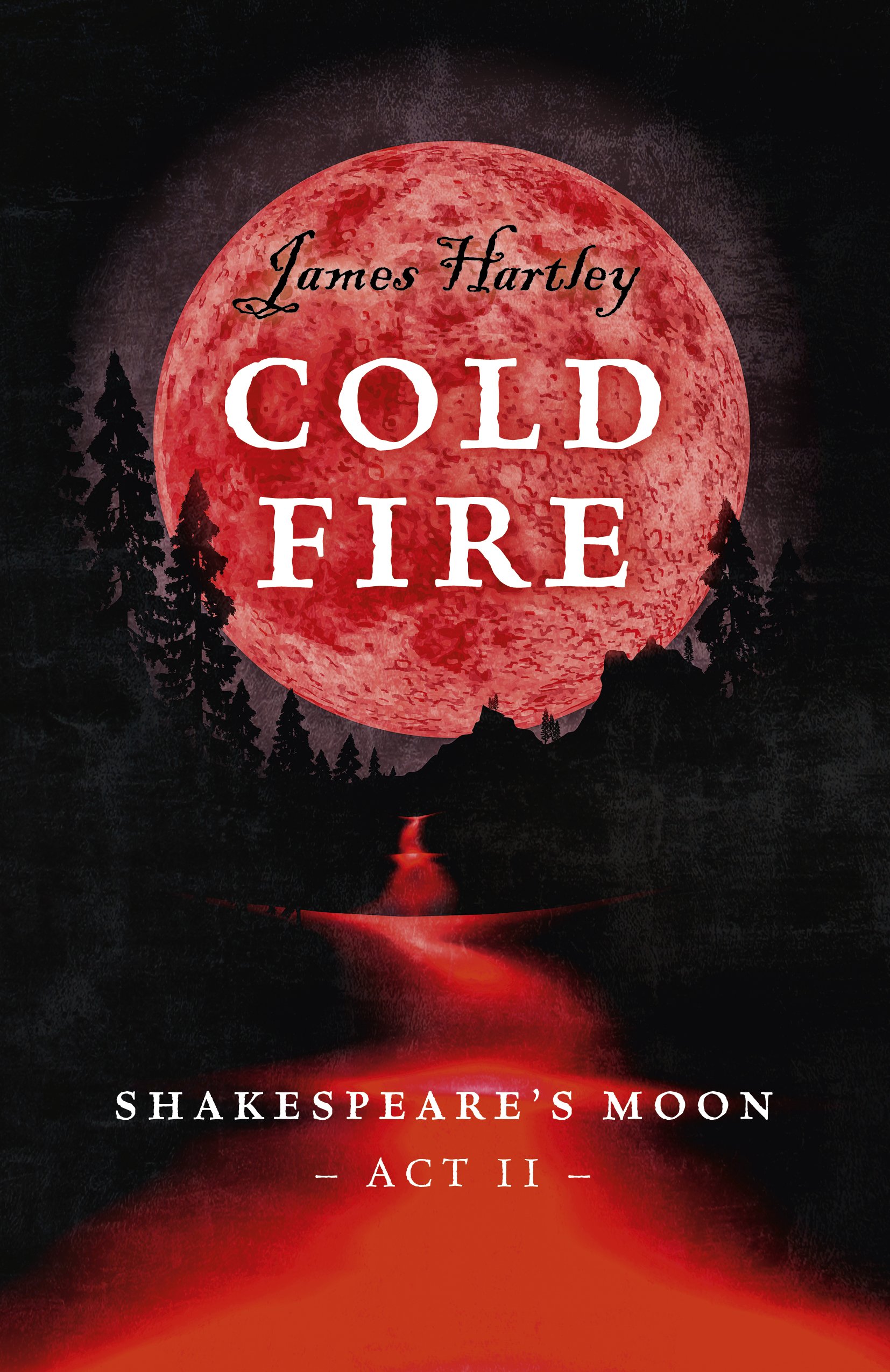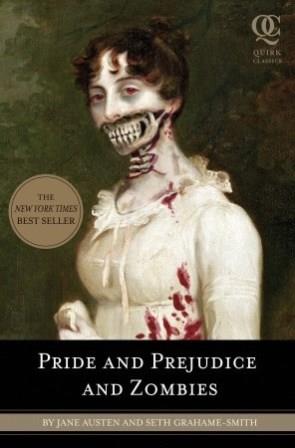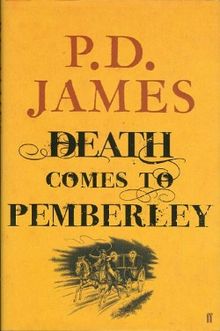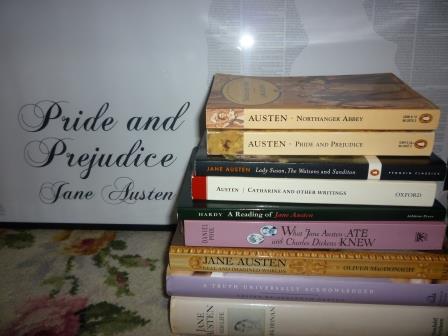
I freely admit that I am slightly obsessed by in love with ‘Pride and Prejudice’.
When I’m feeling ill or grouchy, I instinctively reach for the book or, if I’m feeling really awful, the 1995 BBC adaptation, and it cheers me up to read/ hear the familiar words: ‘It is a truth universally acknowledged…’ I only have to read this far to feel faintly soothed; my shoulders unhunch and I’m ready for all to be put right with the world.
One year I chose to teach P&P to my A level students and was slightly saddened that they didn’t seem to be, well, quite as enthusiastic about it as I was – though I admit that would have been a challenge. They occasionally gazed in awe as I quoted at length to them without opening my book. One even asked: ‘Have you memorised the whole book, miss?’ I reassured him that I hadn’t and that with sufficient rereads under your belt it would be impossible not to absorb some of the more significant quotes, but he gave me a long look that combined equal measures of doubt and pity. I think he had a rather tragic mental image of me, sat at my desk long past midnight, carefully reciting whole paragraphs of prose, then checking the text for accuracy and giving myself a sticker as a reward.
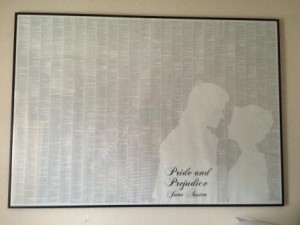
Why yes, that IS the full text of P&P on my wall.
What’s it about?
Jane, Elizabeth and Lydia are three of five sisters who must marry well as their home will pass on to a distant cousin in the event of their father’s death, leaving them dependent upon the cousin for a home and financial support. Bingley is a rich young man who moves into their neighbourhood, causing much excited gossip about his marriage prospects, and Darcy is his rather rude friend who quickly causes offence at a local ball by being proud. Can the older girls make good marriages while staying true to themselves and not embarassing anyone? What will happen to flirty Lydia?
Want more detail? See the bottom of this article.
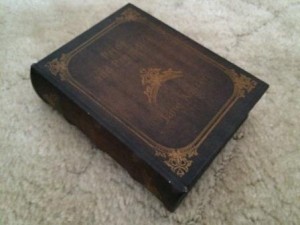
Another P&P book, right? Wrong! It’s hollow, and just big enough to store chocolate. Mmmm.
What’s it like?
Austen tells the story in a very skilful way and there is a neat twist in our perception of two characters half way through. The chapters are reasonably short and the story is told at a fairly brisk pace: Austen doesn’t spend time lingering over setting or background and much of the action is conveyed through dialogue, although there are some letters included to develop the plot and reveal character. (Fun fact: in the story’s original incarnation, ‘First Impressions’, it was an epistolary novel, meaning that it was made entirely of letters.)
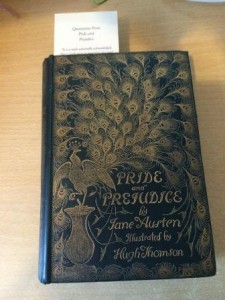
Such a gorgeous cover.
The reason I love P&P so much is not because it’s a romance with a happy ending, (in fact, I feel that Austen ultimately presents a very practical view of marriage, and one could certainly argue that Elizabeth’s affection for Darcy only begins to develop when she sees Pemberley,) but because I enjoy Austen’s gently satiric and often richly comic style. When two characters, who marry for money and social respectability rather than love, set out to meet, Austen notes that Charlotte “instantly set out to meet him accidentally in the lane” and that everything was settled in “as short a time as [his] long speeches would allow”. Austen concisely criticises her characters in a lightly amusing way that encourages the reader to feel critical of their behaviour while recognising that it is the way of the world. In particular, Mr Bennet’s treatment of his silly wife and daughters is highly comic and is bound to provoke a smile at least.
Five reasons why I own at least five copies of this novel
1. It’s brilliant.
2. My cheap Penguin Classics edition just didn’t do it justice.
3. I had to write in my teaching copy. Boo.
4. My husband bought me a beautiful early edition as a thank you for providing him with a beautiful and much loved daughter.
5. See no. 1.
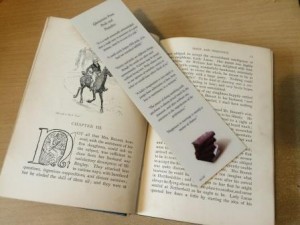
How do you mark your page in P&P? With a P&P bookmark, obviously.
Final thoughts
Read it? Loved it? Good. Read it again and I promise you’ll love it more.* Read it and not loved it? Hmm. Are you sure you didn’t read some fan fiction by mistake? There’s a lot of it out there.
Not read it? Erm…do you plan to read it? Only, I’m not sure we can be friends if you won’t at least try it. Just kidding. We definitely can’t be friends.
Read it squillions of times? Then maybe you’d like to try some of the many revisionings / sequels / nods to the great book itself. Want some ideas for where to start? I’ve reviewed a few of them already and there’s a few more coming soon. Just search for ‘Austen’ within this site . Or you could always just, y’know, read the book again.
As for me, I think it’s time to go watch Mr Darcy take a dip in the lake…
*If I’m wrong, I will happily acquire your edition to prevent you spreading such sedition having to ‘endure’ it again.
